Saturday Q&A
First round of doppelgängers today!
Current Events
S.S. in West Hollywood, CA, asks: With his escalating authoritarianism and Disney battle, has there been any polling that tells us what the people of Florida now think of Governor Ron DeFascist (R-FL)? Has any opinions changed since he won the election? If Florida's election for governor was held today, would he still win?
(V) & (Z) answer: There used to be a pretty good way to answer this question, as Morning Consult regularly surveyed the voters of the 50 states to judge those voters' feelings about their governor. Because it was the same pollster using the same methods every time, it was very plausible to get a sense of whether a governor's popularity was ebbing or flowing.
However, Morning Consult stopped doing that, presumably because the cost-benefit analysis didn't work out. So, measures of DeSantis' popularity are generally based on a national sample. And because of that, and because different pollsters have different methods, the numbers are all over the place. In the five polls conducted in November of last year (i.e., when he got reelected), DeSantis' favorability was +3, +8, +4, +12 and +6. In the five most recent polls, it was +8, -4, +7, +4 and +8. If you want to average those, he went from +6.6 to +4.6. That is well within the margin of error, of course, and again, doesn't really speak to how he's viewed by Floridians.
T.J.R. in Metuchen, NJ, asks: I was wondering, couldn't pollsters determine the difference between their polling in 2016 and 2020 and the actual results in the respective years, and view this as the Trump factor (TF) and factor it in accordingly? For example, if polling said Trump would lose [state X] by 3 points and he won it by 1 point, the TF would be 4 and they would adjust it accordingly. I realize this is very rough, but if they present both numbers (including/excluding) it may show what approximately the TF is.
(V) & (Z) answer: They could but it would be very confusing to most people. It is too blunt an instrument to trust much.
That said, we have been contemplating doing exactly that and might well do something like that as it is only a bit of software. We understand from the mail and surveys we've done that our readers are: (1) very politically astute and (2) very highly educated. We think our readers could understand that this is a very crude way of trying to fix the problem and should be taken with a pound or two of salt. Sensitivity analysis is well understood in statistics and we think we could explain it to an audience in which 20% have a doctorate, 40% have a masters, and nearly all the others have a 4-year college degree. This is not the demographics of the electorate by a bazillion miles.
Chuck Todd or John King could never go on the air and say: "If all the people Quinnipiac polled are telling the truth, then Biden will beat Trump by 2 points. However, if 3 percent of them are lying, like they did in 2016, then Trump will win." The companies' CEO's heads would explode, the lawsuits would fly, and the Republicans would claim the media is in the tank for the Democrats. It would not be tenable. The pollsters know this and don't want to touch it with a barge poll.
What the pollsters ARE trying to do is make corrections to their weighting. What they can do is try to figure out which of the "undecideds" are secret Trump voters. One key question is "Who did you vote for in 2016?" Another is "Who did you vote for in 2020?" If the answers are Trump/Biden, they have a likely undecided on the line. If the answers are Trump/Trump, they know the real answer. Also questions like "Do you own a gun?" and "Do you live in: (1) a city, (2) a suburb, or (3) a rural area?" can help. So can questions about educational level. Pollsters know what percentage of gun-owning, rural, high school dropouts are Democrats and can weight accordingly.
What is harder is dealing with people who don't answer the phone. The pollsters are trying to use text messages, e-mails, and other ways of contacting people. This does not give a random demographic sample, but response rates are higher and they can weight for age, race, education, partisanship afterwards and hope for the best. No doubt many pollsters are scratching their heads to think of innovative ways to try to correct for biased nonresponse, but it is tough.
Another factor to consider is that the electorate of 2016 is not the electorate of 2024. Some of the older 2016 voters may not participate in 2024 for reasons beyond their control. People who were 10 years old in 2016 may vote in 2024. There are also more voter suppression laws now than then. It's really complicated, with no easy fixes.
R.B. in Seattle, WA, asks: I had a horrible realization this week, but I think it is probably accurate, despite my wishes. First, I do believe that the 2024 presidential contest will be a Biden-Trump rematch and I think Biden will very probably win it. But my new realization is that, even then, we probably won't be rid of TFG. I think he will once again run for the Republican nomination in 2028 because, if he's still alive, why wouldn't he? And what is the evidence that would make us think the GOP would be any more able to turn him away then than they are now?
Have I been feasting too long on the dregs left behind by the staff mathematician, or do you guys also think this is plausible?(V) & (Z) answer: It's certainly plausible. 120 years ago, the Democratic Party just couldn't quit William Jennings Bryan, and he ended up as their standard-bearer in three elections (1896, 1900, 1908) while also being a serious contender in 1904. And that's despite the fact that, unlike Trump, he never won a presidential election.
By 2028, Trump could be old enough, or unhealthy enough, or in enough legal trouble that a run is not practicable. Alternatively, enough of his followers may have died or become disenchanted that he's no longer viable. But what it's probably going to take is the Republican Party coming up with a candidate that's more compelling to the base than Trump is. And for nearly 10 years at this point, the Republican Party has not been able to do that.
D.B. in San Diego, CA, asks: I'm curious if you would take on a challenge to make a serious, rational case that the GOP is on the right track these days? My impression as a long-time reader is that you have been quite clear that they're not, and in fact that they are heading the wrong direction fast, but I wonder if it is possible to make the case that they are not? (Setting aside the question of whether you would want such words attached to your pseudonyms...)
(V) & (Z) answer: As an intellectual exercise, sure, we can make the case. Foreseeing the problem of shrinking base, starting close to two decades ago, the Party took strong steps to exploit to the hilt every minority-empowering element of the American system of government, including dominating state legislatures in purple states through gerrymandering, stacking federal courts with ultra-conservative judges, and making sure to be in position to hold 41+ seats in the Senate and a bare minimum of something like 200 EVs. The GOP has largely gotten the hang of small-donor fundraising, such that it can function perfectly well on money that comes from the base, even if the positions of its more extreme members alienate the business class (a business class that, by the way, has little in the way of alternatives, since the Democrats support higher corporate taxes and more regulation). And finally, there is medium-term potential (5-15 years) to bring sizable numbers of Latino voters into the fold (in addition to the Cubans that are already in the fold), and to have them replace the older voters as they die off.
The Republican Party, as currently constituted, is never going to have a 1984-Reagan-style landslide presidential election, nor is it likely to have anything more than a thin majority in either chamber of Congress. But if the goal is to keep the government from doing much of anything, and to roll back the occasional regulation, law and/or lefty court decision, then a firm grip on "just enough" of the government is enough.
D.S. in Sydney, NSW, Australia, asks: E-V.com is approaching its 20th birthday. Reflecting on nearly two decades of the site, what are the top few changes in US politics in that time in your view? Which, if any, surprise you the most, ie. you could not have foreseen when you started the site?
(V) & (Z) answer: The biggest change is that the Republican Party has become racist, venal, and totally hypocritical. George W. Bush was a conservative, but he wasn't racist and he certainly wasn't personally venal. His two closest advisors, Condi Rice and Colin Powell, were Black, and he picked them because he trusted them completely, not because he was trying to trick Black voters into voting for him. He ran for the job to show Dad that he was a better politician than Jeb!, not to use the White House as a profit center. He had plenty of faults, but he wasn't corrupt to his core.
Nowadays, the whole point of the Republican Party is to maintain power so it can make the libs' blood boil. Policy is secondary. The only clear policy goal is lower taxes for rich people and big corporations, and even that is optional when it suits their needs (see DeSantis vs. Disney). Even abortion isn't really something the leaders care about. Do you really think Senate Majority Leader Mitch McConnell (R-KY) gives a hoot about it? He and Speaker Kevin McCarthy (R-CA) and Donald Trump know that part of their base cares about it passionately, so they do what they feel they need to do to keep the base happy, but they are being hypocrites about it. That wasn't so much the case 20-30 years ago. Then Republican leaders mostly did stuff they actually believed in.
Another big difference is that certified lunatics, like Rep. Marjorie Taylor Greene (R-GA) were kept locked up and ordered to sit down and shut up. They were not allowed to run the Party.
The Democrats haven't changed so much. Their goals aren't so different now from what they were 20 years ago and their internal politics are messy but that always has been the case. Joe Biden is kind of like Bill Clinton, only older and without the ability to charm the spots off a leopard.
Politics
C.B. in Ashburn, VA, asks: Though I think the hypocrisy is on full display from House Republicans with their budget cut demands for a clean debt ceiling—something they never made a peep about with Trump as President—it does appear the Biden administration is softening their stance on some of their demands. One is work requirements for Medicaid access—namely able bodied persons needing to work at least 80 hours per month. I have heard work requirements don't work; I think something to do with the complications that exist for commuting for a number of these Medicaid recipients. But at its heart asking able bodied people to work does sound reasonable. So can you touch upon why they don't work or cases where they have worked and are there some things they could do to make these programs work better.
(V) & (Z) answer: There is one hypothetical effect for these sorts of work requirements and one real effect. The hypothetical effect is that they will cause people who receive aid to improve their economic and professional profile, lifting them in terms of social status, and perhaps allowing them to become entirely self-sufficient.
Study after study has shown that it does not work out that way. The basic requirement for most work-for-aid situations is a minimum of 20 hours a week. Someone who works part time ends up spending a disproportionate amount of time on their "job," as they often have to work odd hours and short shifts and to spend a lot of time traveling for a relatively short amount of work time. Meanwhile, the time and energy this entails takes time away from things like caring properly for children, looking for actual full-time work, taking classes in pursuit of a degree and doing what is necessary to overcome or manage long-term health problems.
On top of all this, the kinds of jobs that entail 20 hours a week of labor, particularly from someone who is operating at a competitive disadvantage (chronic health problems, childcare demands, lack of marketable skills, victim of racial or other biases) tend to pay poorly, as opposed to a "get out of poverty" wage. Oh, and the need to "report in" and prove that benchmarks are being met adds a whole extra layer of bookkeeping and red tape; this sucks up time and resources from both the workers and the government.
And that leads us to the real effect of these requirements. Because of all the hassle, and because many people struggle with paperwork and red tape, the imposition of work requirements invariably leads some people to give up and to stop claiming SNAP, Medicaid, child tax credits and other benefits. This might save the government money in the short term, but it also has the effect of increasing homelessness (and potentially crime), harming children, and making it easier for disease to become epidemic or pandemic.
There's really no disputing all of this; there's been plenty of real experience and real research (this page aggregates quite a few studies). Given that work-to-receive-aid never produces the claimed benefit (it will elevate people!), but does compel some people to drop out of the aid programs, it's fair to ask what the Republicans' real motivation is here.
E.W. in Skaneateles, NY, asks: Why can't New Hampshire and South Carolina have their primaries on the same day? If New Hampshire just has to go first (which is obnoxiously elitist, in my view), couldn't they just open the polls at midnight as in Dixville Notch and then let South Carolina start voting a few hours later?
Also, you mentioned that the vote to expel Rep "George Santos" (R-NY) might end up 434-1. However, wouldn't "Santos" have to recuse himself? Are members allowed to vote on their own expulsion or other personnel matters like ethics referrals? What if "Santos" ended up being the deciding vote on whether he stays or goes?
Of course, all of this is probably a moot point because "Santos," in his official dual capacity as Chief Justice of the United States Supreme Court and Supreme Mugwump of the International Confederation of Wizards, will simply rule he can stay.(V) & (Z) answer: New Hampshire doesn't want to "technically" go first, they want to go first. They are not going to be happy with a loophole-based solution. Nor, most likely, is the DNC. The process is set up, rightly or wrongly, to allow candidates to focus intently on primary state #1, then primary state #2, then primary state #3, in order to give an opportunity to build Jimmy Carter 1976-style momentum. The Party generally prefers to wait until a bit of winnowing has happened before scheduling multiple primaries on the same day.
As to "Santos," Rule III of the House Rules (pdf) says: "Every Member shall be present within the Hall of the House during its sittings, unless excused or necessarily prevented, and shall vote on each question put, unless having a direct personal or pecuniary interest in the event of such question." So, "Santos" theoretically should recuse himself, since he would have a direct personal interest in the question of expulsion. But the House rules contain no provisions for actually forcing a member to recuse themselves. As with the Supreme Court, he would be expected to do the right thing and to voluntarily recuse himself. And does he really seem the type to do that?
And speaking of the Supreme Court, he's not Chief Justice anymore. Didn't you know he stepped down after bringing an end to school segregation in Brown v. Board (1954)? He is still on the Wizengamot, however.
J.B. in Radnor, PA, asks: Your item about whether Jack Smith is investigating the stolen voting machine in Georgia raised a couple of questions for me: (1) What is the statute of limitations on the various crimes Smith is investigating, and might that run out before he pulls the trigger on any indictment(s)?, and (2) realistically, what would be the deadline for DOJ to carry out any indictments of Trump? I'm not only thinking of the DOJ policy against influencing elections, but the need to complete any trial before the 2024 election to prevent the possibility of Trump winning and his hand-picked Attorney General being able to drop any charges.
(V) & (Z) answer: We can't know for certain what crimes Smith is pursuing, of course. However, most federal crimes have a statute of limitations of 5 years. So, assuming Smith is looking into anything related to 1/6 or to the 2024 presidential election or to documents at Mar-a-Lago, then he's got plenty of time, statute-of-limitations-wise.
Because a Trump indictment and prosecution would be so consequential, and so unprecedented, there is no real answer to the amount of time that would be needed. Normally, the hold-up in federal cases is that the federal docket is jam-packed, and it takes time to get into court. Given the nature of the Trump situation, his case(s) would surely be fast-tracked, and the primary time-burner would be the extent to which his lawyers could persuade a federal judge or judges that they needed 2 weeks, 4 weeks, 6 weeks to prepare. Our guess is that as long as the indictment or indictments are filed by January 1 of next year, that will be enough time to take care of business. For what it's worth, the Watergate indictments were issued on March 1, 1974 and all were resolved by February 1975.
Any lawyer-readers care to weigh in on the hypothetical timeline here?
W.S. in Austin, TX, asks: Could the FDA just reapprove mifepristone if SCOTUS rules the prior approval is invalid for some reason?
(V) & (Z) answer: The short answer is "yes, maybe."
The long answer, however, is that the case that was brought against the FDA uses many angles of attack. Some of those would be resolved by re-approving the drug. On the other hand, it's at least possible that there is a finding that the FDA's entire power to approve drugs is unconstitutional. It'a also possible that the courts sustain the Comstock Act, and the notion that this 1873 law makes most means of distributing mifepristone illegal. In these cases, reapproving the drug wouldn't do much.
Meanwhile, the ruling of Judge Matthew Kacsmaryk is quite the exercise in the writing of legal fantasy. The ruling about to come down from Ho & Co. does not figure to be much better. SCOTUS appears to be less willing to stand on its collective heads, but you never know. Depending on what SCOTUS does, it may be possible that the final legal disposition leaves open the possibility that a different approval process would be acceptable, while making it virtually impossible to determine exactly what that different, acceptable approval process would look like.
If you want a much fuller breakdown than we can do here, the Kaiser Family Foundation is the preeminent think tank for health policy, and they have an extensive analysis here.
Civics
E.A.K. in San Francisco, CA, asks: Please game out the scenario if Joe Biden dies or becomes incapacitated after being nominated.
If he's on the ballot on 50 states and wins, then what? Does Kamala Harris automatically get sworn in on Inauguration Day?(V) & (Z) answer: That depends on exactly when he becomes unavailable. If it's months before the election, the Democratic Party has rules that allow the Democratic committee to hold a meeting and choose a replacement candidate (the Republican Party has such rules, too). This would have to happen before early voting began, and before the deadline for printing ballots. Once we reach Oct. 1 (a little over a month before the election), the point of no return would have been passed.
Even if a deceased/incapacitated Joe Biden ends up on the ballot, the Electoral College theoretically offers a chance for the party to "switch" candidates. The DNC could meet, decide on a replacement, and announce that Biden electors will be asked/instructed to vote for the replacement candidate instead. Consequently, a vote for "Joe Biden" would really be a vote for "replacement candidate."
However, this is a somewhat dodgy option, since different states have different rules for whether or not their electors are allowed to be faithless. If the election was not close, and the Democrats won 333-205, probably not an issue. But there's no way to know exactly how close it's going to be until it happens. Plus, if the replacement candidate was anyone other than Kamala Harris, it would be a really bad look for the Party, and would also potentially alienate some key voting blocs, not the least of them Black voters and women (particularly if the replacement was another white guy).
Consequently, what the DNC would almost certainly do is announce that they are very comfortable with Kamala Harris and her ability to be president. Then, assuming the Biden-Harris ticket won, the Electoral College would choose Biden as President and Harris as VP. Under the terms of the Twentieth Amendment, Harris would then immediately become president-elect once the Electoral College had voted, and so would be sworn in as president on Jan. 20, 2025.
G.W. in Dean, PA, asks: After the current debt-ceiling crisis is over, could Joe Biden invoke the Fourteenth Amendment for future consideration? Thus allowing the courts to rule on it?
(V) & (Z) answer: Well, Biden could announce that the next time the U.S. approaches the debt ceiling, he's going to ignore it consistent with the language of the Fourteenth Amendment. But that would just be words until the situation actually unfolded, and he actually did it.
There would also be no way for the courts to weigh in prior to that point, either. In contrast to many other democracies, federal courts in the U.S. do not issue advisory opinions. So, it would have to wait until the debt ceiling was breached, the Fourteenth Amendment was invoked, and someone filed suit and made the none-too-easy-to-make argument that they have been harmed and that they want the President's decision to be reversed.
S.C. in Mountain View, CA, asks: S.C. in Mountain View, CA, asks: Your item on Sen. Dianne Feinstein (D-CA) motivated me to ask Mr. Wikipedia and Ms. Internet some questions, the fundamental one being, who has standing to ask that a conservator be appointed to make decisions on Senator Feinstein's behalf? However, I quickly got lost. So, perhaps you can engage the California section of your legal roundtable to address these questions:
- Would I, as a California voter, have standing to request that a conservator be appointed to make decisions on Senator Feinstein's behalf?
- Would the California Democratic Party have such standing?
- Would the Governor of California have such standing?
- Would her daughter, Katherine Feinstein, have such standing?
- What would be the process?
(V) & (Z) answer: We both have some experience with this, and so can give you a pretty decent answer, despite our lack of law degrees. As a general rule, courts follow the same basic guidelines for appointing a conservator as they do for appointing someone to oversee the estate of someone who dies intestate. Judges really, really prefer a close family member who has the appropriate maturity and wherewithal to act on behalf of the person who is incompetent or deceased. The Senator has one child, namely Katherine, and Katherine is a former judge of some renown. She's exactly the kind of person from whom the Court would strongly consider a petition for conservatorship. And if anyone else showed up and tried it, the first question the Court would have is: "Why isn't Katherine here?"
If Katherine is alienated from her mother (and we have no reason to believe that is the case), or if she was unwilling or unable to get involved, the person the Court would prefer be next in line is Eileen Feinstein Mariano, who is Dianne's only grandchild and Katherine's only child. If Mariano was similarly unavailable, then the Court would consider a friend who could make a persuasive argument that they know the Senator is not right, and that they will protect the Senator's interests. The non-relative who probably fits the bill best is actually... Nancy Pelosi. Pelosi and Feinstein are neighbors, longtime friends and longtime colleagues. Pelosi obviously has plenty of mental and financial wherewithal, and is not likely to steal from Feinstein's bank accounts. Also, Pelosi's daughter has been acting as Feinstein's caregiver in Washington.
The process for appointing a conservator is pretty straightforward, albeit pretty substantial, since a person's fundamental personhood is effectively being taken from them. There's a big bunch of paperwork, the subject of the conservatorship has to be given an opportunity to object and explain why it's not necessary, and then the Court has to decide what kind of evidence is needed in order to justify the conservatorship. Sometimes, video/audio and witness testimony is enough, but sometimes the Court wants an investigation. The Court also has to decide on the nature of the conservatorship; there are personal and economic conservatorships (decisions about personal matters vs. decisions about economic matters) and there are general conservatorships and limited conservatorships (can make any decisions needed vs. can only make certain, specified decisions).
We suspect that, when you ask about the process, you really mean "How long would this take?" Normally, it takes a couple of months to get the first hearing, and then the judge often sends the would-be conservator off with instructions and schedules them for another hearing 6-8 weeks later. Rinse and repeat until the judge is satisfied, which means a conservatorship can sometimes take as much as a year or so to establish. However, in emergency circumstances, a conservatorship can preliminarily be approved in less than a week. In this case, unless Dianne Feinstein did something that nearly caused serious injury or death, an emergency conservatorship would only be granted to Katherine Feinstein, and only if Katherine is willing and able to make the case that her mother is deeply compromised and simply cannot be allowed to make her own decisions anymore.
We are, of course, happy to hear from any lawyer-readers who have something to add to this answer.
R.S. in Ticonderoga, NY, asks: In your summary of the election results for the Pennsylvania State House earlier this week, you noted that with the Democrats holding the house, there won't be an abortion referendum on the ballot next year—at least through legislative action. I assume the Democrats can't put forward an abortion protection referendum because they don't control the Senate and the Republicans in that upper house are savvy enough to know the pitfalls of putting that on the 2024 ballot?
(V) & (Z) answer: That is correct. Pennsylvania has no procedure for citizen-initiated referenda. So, the only entity that can put referenda on the ballot is the legislature. And there is no way the Democratic-controlled House and the Republican-controlled Senate are going to come to an agreement on such a thing.
There are some localities that allow referenda, so it's at least possible there will be abortion-related referenda in some local elections. That's what we meant when we added the qualifier "at least [not] through legislative action."
S.G. in Manassas, VA, asks: Last week I noticed that the flags out front of the hospital where I work were at half-staff. On Friday, they were back up at full height again, but down again on Monday.
Who died recently, besides CNN's credibility?(V) & (Z) answer: Well, the singer Gordon Lightfoot died this month, as did former A's pitcher Vida Blue, and the wrestler "Superstar" Billy Graham.
That said, you probably aren't going to buy that the half-staff flags were in their honor. And you would be right. From Sunday, May 7, through Thursday, May 11, flags were flown at half-staff nationwide on the orders of Joe Biden in honor of the victims of the shootings that killed eight people in Allen, Texas. They were flown at half-staff nationwide on Monday, May 15, again on orders from Biden, in honor of Peace Officers Memorial Day.
Sometimes, the half-masting is on the orders of state governors, usually in honor of specific deceased officeholders or soldiers or law-enforcement officers or crime victims. But you are in Virginia, and there were no Virginia-wide orders in the last week. The last time there was a special-to-Virginia half-staff order was back in April, on the anniversary of the Virginia Tech shootings.
M.G. in Burien, WA, asks: Since the Congress is reluctant to pass any legislation concerning the control of guns, specifically assault rifles, why can't our government place a special "use tax" on the ammunition? If ammo cost twenty bucks a round then perhaps that would be incentive to leave the silly thing hanging on the wall.
(V) & (Z) answer: Possible, but there are two problems. The first is that the gun lobby would file a lawsuit so fast it would generate a sonic boom, arguing that the tax is an end-run around the Second Amendment. Since that is exactly what it would be, that lawsuit might well prevail. Second, experience has shown that if you make a thing prohibitively expensive to buy legally, then what happens is the development of an extensive underground illegal economy in that thing. See, for example, Prohibition.
History
D.E. in Lancaster, PA, asks: There's probably not an answer to this one but why are Republicans SO bad at comedy? See here and here for examples.
Or are they like a creepier Lt. Cmdr. Data; they don't have the human part down, and so they can't do the laughter? When your answer to Jon Stewart, Stephen Colbert, Jimmy Kimmel, and Samantha Bee is Greg Gutfeld, you know you have serious problems.
Since we're talking about political comedy, who were the best comedian presidents? My guess would be Lincoln at the top of the list; but am curious to what you say. Please just don't say St. Ronnie of Raygun. Although "Millard Fillmore," like "The Larch," would be acceptable.(V) & (Z) answer: (Z) actually has a lecture on the different styles of comedy. There are different ways of breaking it down, but his list is: Screwball/romCom, character comedy, slapstick, comedy of manners, social commentary, anarchic/surreal, parody/satire, blue/gross out, fish out of water, and black comedy.
The basic point of that lecture (recall, this is a film class) is that comic filmmakers invariably blend multiple types of comedy, in part because different types work better for different purposes, and in part because a particular blend suits the filmmaker's needs. For example, Mel Brooks films are invariably social commentaries, made more palatable by heavy doses of slapstick, parody, and character comedy, along with judicious use of gross out, black and surreal comedy.
None of these styles is inherently about partisan politics, and some of them don't really lend themselves to partisan politics very well at all. So, if a person insists on making partisan comedy, they are leaving a lot of potential styles (in other words, a lot of potential tools) on the table. If a genius like Mel Brooks feels the need to use the whole toolkit, or most of it, then that should be a lesson to less-talented would-be comic minds.
And then, on top of that, if you're only willing to go after Democrats in your partisan comedy, then you leave a whole bunch more potential material on the table, unused. And at a time when the most mockable folks tend to be on the right side of the aisle (Marjorie Taylor Greene, Donald Trump, Lindsey Graham, Ted Cruz, etc.). It's like trying to be successful in baseball using only right-handed pitchers who throw only curveballs. Or trying to be successful as a chef using only a paring knife and broccoli. Or trying to be successful in music using only bass guitarists who can only play two chords (though, admittedly, that worked for the Sex Pistols).
When pointing to the success of "liberal" comedy, people point to talk-show hosts like the ones you list, or to Saturday Night Live, but this doesn't actually stand up to scrutiny. Using Saturday Night Live as our example, because it is the one that will be most familiar to people, it's true that many of the people involved in that show over the years are/were young and liberal. However, it is not the case that all of them are—in particular, the well-respected 1990s cast was full of right-wingers, among them Dennis Miller, Victoria Jackson, Rob Schneider and Adam Sandler. Further, the great majority of SNL sketches are not political at all—think Leonard Pinth-Garnell, John Belushi's Samurai, the land shark, Gumby, the William Shatner "Get a Life" sketch, Hans and Franz, Wayne's World, Opera Man, Unfrozen Caveman Lawyer, Matt Foley, Debbie Downer, "More Cowbell," David S. Pumpkins, Matt Shatt, "The Californians," etc.
Even when SNL does get political, they are more than willing to skewer people on both sides of the aisle. Darrell Hammond and Phil Hartman both had brilliant takes on Bill Clinton. Same for Amy Poehler and Kate McKinnon with Hillary Clinton. Everything we say here is also true of Stewart, Colbert, Kimmel, and Bee. Doing good comedy is hard enough that you just can't make anything "off limits."
As to funny presidents, it depends on whether you're talking about presidents who knew how to deliver a joke that was written for them, or presidents who were able to be witty off-the-cuff. Like it or not, Ronald Reagan, as a professional actor, knew how to deliver a joke (and was also not bad off-the-cuff). Barack Obama has a similar profile to Reagan; he really knew how to read a humorous script, and he could toss off a good laugh line of his own once in a while.
Among other presidents who were very witty, the unquestioned king is Abraham Lincoln, who honed his skills on the then-frontier, where the only entertainment people had was each other. Theodore Roosevelt was a funny guy, though in Victorian style, which may not translate well today. For example, he once described his opponents as "circumcised skunks" and "copper-riveted idiots." Those may not be funny today, but they were real knee-slappers 125 years ago. Theodore's cousin Franklin was also good with a quip; so too were Calvin Coolidge and John F. Kennedy.
This list of funniest presidents contains men who came either from Illinois (Lincoln, Obama, Reagan) or from the Northeastern U.S. (the Roosevelts, Coolidge, JFK). Maybe that's a coincidence, maybe it isn't. We can't really think of a Southern president who was known for his wit, though we have a hard time believing that someone as smart and well-spoken as Thomas Jefferson couldn't be pretty funny, if he put his mind to it.
M.G. in Boulder, CO , asks: You've given us your opinion of five Northern generals who fought the Civil War. Would you balance that with opinions of five Southern generals? I'll even let you choose them.
M.C. in Reno, NV, asks: Today (May 13th) the staff historian gave us a great elucidation of the ratings for 5 major Civil War generals. But come on man—now do the ones everyone wants to see: Grant, Lee, and Stonewall Jackson.
(V) & (Z) answer: Keeping in mind that the rubric used was skill as a tactician (T), strategist (S) and administration (A), here goes:
- Grant (T: 10, S: 10, A: 8): There is no such thing as a general who commanded troops in battle for any period of time and made zero mistakes. Certainly, Grant made his share, most famously at Cold Harbor. He himself admitted it: "I have always regretted that the very last assault at Cold Harbor was ever made. No advantage whatever was gained to compensate for the heavy loss we sustained." That said, Grant won more often than he lost, by a fair margin, and he usually managed to do more damage to the enemy than the enemy did to him, despite Grant's usually being on the offense. The General was also no prisoner to "the way it's always been done," and if tactical plan #1 didn't work, he'd move on to #2, #3, and #4 until he found one that did work. As a strategist, he developed and implemented the plan that won the Civil War, and did so despite a lot of pooh-poohing from traditionalists. As an administrator, he was very good at working with other generals (and was particularly good at managing their giant egos), and also formed a rock-solid partnership with his commander-in-chief, Abraham Lincoln. The only black mark we'll point out is that Grant sometimes stepped on the toes of civilians needlessly, perhaps most famously with his order barring Jews from his encampment.
- Lee (T: 6, S: 6, A: 10): Lee was a capable tactician, but was too deeply invested in out-of-date Napoleonic ideas, which led him to make numerous foolish choices, most obviously ordering the Pickett-Pettigrew Charge at Gettysburg. Strategically, he understood the big picture well enough to realize that Nov. 8, 1864 was the key to the whole war, as that was the day that Abraham Lincoln either would or would not be reelected. However, Lee's grand strategy for keeping the Confederacy viable until that date did not work especially well and was not well considered. Ultimately, even if the Antietam and Gettysburg campaigns had been successful (and they weren't), it's hard to see how the benefits outweighed the costs. Invade the North in 1864? Ok, maybe. But in 1863, in particular, with neither midterm nor presidential elections on the horizon? How does that make sense? Lee did do an excellent job of keeping his army in the field and reasonably well supplied, and he dealt well with the prima donnas under his command, as well as the prima donna in the Confederate White House. And, of course, his soldiers and the Southern populace worshiped him.
- Jackson (T: 8, S: 5, A: 2): Jackson was a very bold tactician, and he won some very impressive victories. But that was primarily a product of his willingness to take big risks, which works well when you're up against timid opponents like George McClellan and Ambrose Burnside, but would likely have been disastrous against Grant (we'll never know for sure, because Jackson died before troops under his command could face troops under Grant's command). As a strategist, Jackson was presumably capable, since he taught strategy before the war, but thinking about the big picture wasn't really his job, and so we don't have a lot of direct evidence to work with. As an administrator, Stonewall doesn't have too much to recommend him. He didn't get along well with anyone besides Lee, he was widely regarded as something of a nutter, and he was not liked by his own troops. There is some speculation that the friendly fire that led to his death was not a mistake, but there's no way to know for sure.
- James Longstreet (T: 8, S: 7, A: 5): Longstreet was almost certainly a better tactician than his superior officer Lee; certainly he understood the situation at Gettysburg better than Lee did. He was also probably a better strategic mind since he was, on the whole, smarter than Lee. Definitely, Longstreet grasped better than Lee did that keeping a viable army in the field was more significant than winning specific battles. But despite his arguably better military skills, Longstreet did not have the people skills or the political skills to rise above Lee, and was really mediocre at best at that part of the job.
All of this said, the real reasons that Longstreet gets pilloried in the books written after the war by most of his fellow Confederates are: (1) they simply couldn't bear to say bad things about the by-then-deceased St. Bobby Lee and (2) Longstreet had the temerity to join the Republican Party during Reconstruction. If you read a passage from George Pickett or A.P. Hill or Richard Ewell or Jubal Early slamming Longstreet's generalship, you should take it with many grains of salt.- Albert Sidney Johnston (T: 6, S: 7, A: 8): These numbers are somewhat speculative. Johnston served in three wars (Texas Independence, Mexican-American, Civil), and commanded troops in the latter two. His record as a tactician in Mexico was good; in the Civil War it was more mixed (at least in part because he ended up facing off against Ulysses S. Grant several times). As a strategist, he was apparently very impressive, and as a manager of men (civilian and military) he was apparently even more so, such that most of the Confederate leadership thought of him as the best general the South had. And they made him the second person to be granted four-star rank (Samuel Cooper was first, but only because that was necessary due to Cooper's central role as a behind-the-lines administrator). We'll never know for sure how good Johnston could have been, however, because of all the military lessons he learned, the one he didn't absorb was when to duck. So, he was killed by enemy fire on April 6, 1862, at the Battle of Shiloh. That means he lasted for just less than a year of the Civil War (it began on April 12, 1861), and he never really got the opportunity to show what he could do.
- Nathan Bedford Forrest (T: 8, S: 2, A: 2): This is a very difficult one to write, because it's very complicated. However, Forrest has been lionized for so long, we really have to put him on the list (Shelby Foote famously called Lincoln and Forrest the two true geniuses of the war). Anyhow, there is no question that Forrest was a bigot and an a**hole, and that he was guilty of war crimes. But we're going to put that aside as it's not directly germane to assessing his skills as a general. Similarly, he was unquestionably one of the bravest people on either side of the war, but that's not directly germane, either.
Though he had no formal military training, Forrest was certainly an excellent tactician, and knew better than almost anyone in the Civil War (outside of Phil Sheridan) how to win cavalry engagements. That said, we don't award a full 10 here because some of Forrest's success was due to his willingness to take reckless gambles, and to be more violent than was necessary. As a strategist, Forrest was pretty dismal. He wanted to fight; he did not want to sit in some tent or office and instruct others when and how to fight. So, when he was in some sort of overall command, he almost invariably performed poorly, and he certainly was responsible for more than one Confederate defeat. Even when he was in the saddle, and was commanding just his troops, he rarely thought about how his activities fit into the big picture. As to administration, Forrest's men certainly loved him and were inspired by him, and that's something. But he otherwise did not get along with subordinate or superior officers, couldn't deal with the civilian leadership, and he deserves the blame for many logistical screw-ups that happened when he was overseeing units other than his own. He's in the running, with Lee, for the title of most overrated general of the war.
F.S. in Cologne, Germany, asks: Why did Franklin D. Roosevelt choose Harry S. Truman as his VP in 1945 instead of Henry Wallace, who was vice president prior to Truman? Did it make a major difference that Truman became U.S. president in 1945 and not Wallace?
(V) & (Z) answer: To start, it's not entirely correct that FDR chose Truman. Because he felt it would be politically damaging to take sides, FDR largely did not express a preference as to who his running mate would be, and left it to the convention to choose between Wallace and Truman.
That said, FDR was a very savvy political operator, and he knew that the pro-Truman forces held the upper hand (despite the fact that Truman himself didn't particularly want the vice presidency, as he was very happy as a senator). The main source of opposition to Wallace was the Southern wing of the Democratic Party, due to Wallace's anti-segregation views. Also problematic, at least for some Democrats, were Wallace's unorthodox views about religion (he dabbled with various flavors of liberal Christianity, but also with mystics like Native American medicine men), and his frequently stated view that the Soviet system was not so bad, and that it would be possible for the U.S. to remain partners with the Russians after World War II was over.
This struggle was regarded, quite correctly, as extremely consequential because it was clear that FDR was dying and would not survive his fourth term. At the same time, he was sure to win reelection. Ergo, in choosing the VP, the delegates knew full well they were also choosing the eventual 33rd president of the United States. As it turned out, FDR only made it a few months into term #4 before going to the big White House in the sky.
Gallimaufry
H.F. in Pittsburgh, PA, asks: In yesterday's item about controversial graduation speakers (Z) wrote he "has ... successfully managed to avoid all but one graduation ceremony for himself (and he didn't particularly want to go to that one)." There has to be a great story behind that. Don't leave us hanging.
(V) & (Z) answer: Not that great a story, unfortunately. (Z) missed his high school graduation because he showed up wearing shorts under his graduation robe, and was sent home to change. By the time he got back to campus it was too late. This was not a bad outcome, as far as he was concerned.
He did attend the graduation for his undergraduate degree, because his mother and stepfather and grandmother really wanted to be at the ceremony. The whole thing was a disaster. That was right before smaller, departmental graduations became common at UCLA, and so (Z) went to the Letters & Sciences graduation, which meant that something like 4,000 people were all graduating at the same time. It was a blazing hot day, and for that many people to file in once the audience was seated took something like an hour. That's an hour standing in all black clothing, in the sun. Then, the venue (Pauley Pavilion, the basketball arena) has air conditioning good enough for 16,000 people in the stands. It does not have air conditioning good enough for 16,000 people in the stands plus 4,000 sitting on the floor. So, with all the heat and people, it was like sitting in a sauna for 2 hours. Many of the young women who were graduating looked like raccoons or clowns because their makeup ran all over their faces, and there was no way to leave the floor and go fix it. The university couldn't read 4,000 names, so in order to make sure every graduate felt represented, they allowed every department chair to give a little speech. There were something like 19 different departments, which meant 19 different speeches. And whatever qualifications make someone a good candidate for department chairing, being an engaging public speaker is clearly not among them. Most of the 19 speeches by the chairs were somewhere between boring and cringe-worthy. The main speaker was some sort of undersecretary for some Cabinet department that's in the teens in the line of succession, and that speech was forgettable, too. After it was all over, and the grads filed out, several of them threw up outside because they were suffering from some level of heat prostration.
(Z) has a Masters degree, but they really don't do graduations for those when they are just a way station en route to a more advanced degree.
As to the Ph.D., (Z) was already teaching full time by the time of that graduation ceremony. And, conveniently, he was giving an in-class final exam at the time of the Ph.D. hooding. That is, by the way, the only time in his career he's given an in-class final. Probably just a coincidence.
M.A. Montreal, QC, Canada, asks: Sometimes I find certain posts particularly insightful, interesting or funny, and, probably primed by too much time spent on social apps, I feel the urge to provide some kind of positive feedback.
Have you ever considered adding a thumbs up, +1, or emoji picker action to posts?(V) & (Z) answer: We've very briefly pondered this idea. There's no way we'd ever put a thumbs down, since both experience on other sites, as well as academic studies, make clear that nothing good comes of that. There is some merit to a thumbs up, for various reasons, but it would be a pretty serious technical feat, given the current programming of the site. And if we ever got serious about it, well, it would be a long time from now because there are many priorities on the list above that. Some of those priorities will be in progress in the near future, however, because the summer has arrived.
Reader Questions of the Week
Here is the question we put before readers several weeks ago:
R.D.B. in Winsford, Cheshire, UK, asks: In the U.K. we've had a variety of P.M.s, good, bad and ugly. In the U.S. you've had your own share of good, bad and ugly presidents.
To my knowledge, only one person could legally have held both positions (Boris). But hypothetically, are there any past P.M.s who could/would make potentially good presidents or any presidents/nominees who could have been successful P.M.s?And here some of the answers we got in response:
M.C. in Reno, NV: If the true difference between a P.M. and a President is that the P.M. must much more closely wrangle their legislative branch, then I submit Lyndon Johnson would have made an exceptional P.M.. His skill with arm-twisting was legendary in his day.
C.S. in Charlotte, NC: I think a case can be made that Sir Winston Churchill could have become President. He was born to an American-born mother and would have been able to qualify in the same way as Sen. Ted Cruz (R-TX).
As you know, the average British P.M. is on the whole more to the left than the average American president. President Barack Obama had a famously cordial relationship with David Cameron, who is a Tory. Had David Cameron been involved in American politics he probably would have been a moderate Democrat. Even a supposed Europhile like Boris Johnson would have a hard time in the modern Republican party. Likewise, a Trump-like candidate would have difficulty in the UK.
The closest P.M. in my lifetime that could have done well in the United States is Tony Blair. It is no coincidence that his counterpart in the U.S. (and who overlapped for some years) was Bill Clinton. Both had a brilliant ability to capture the middle of the electorate and revive their party's then-moribund fortunes. I could easily see both getting elected in both countries.
J.P. in Horsham, PA: Given his post-presidency in the House of Representatives, I'm going to say that John Quincy Adams would have made a pretty good (albeit polarizing, given the issue of slavery at the time) P.M..
K.C. in Hindhead, England, UK: Margaret Thatcher would have been the best with her Obamaesque grasp of the brief, but with Ronnie Reagan's grasp of the bigger picture. However, alas, the U.S.A. is three female leaders and almost half a century behind the old country in their acceptance of women in politics.
A.K. in Columbus, OH: Bill Clinton would have made an excellent P.M.. He could read a room and the political winds better than most and sought compromise when the winds shifted. He would accept half a loaf and move on. In short, he wasn't wedded so strongly to principles (in just about anything).
C.J. in Redondo Beach, CA: There would be others out there that I think could have excelled in 10 Downing Street, but I'd have to throw Woodrow Wilson at the top. Not only did he study American government and history, he really studied the British. In fact, at heart he wanted to tear down the American system and use the British one as a model of remaking the American government. He loved how the Parliament operated, and how the P.M. was in charge of both it and the executive.
S.B. in Berkshire, England, UK: My wife and I are from Kansas and have lived in the U.K. for the last 12 years. During the beginning of Barack Obama's second term, we had the privilege of attending a Town Hall type of gathering at our local (pub) at which our local M.P., Theresa May, was present. A number of local council representatives were also present during the meeting. All of the elected officials took questions from the audience; the local representatives had the usual evasive and unclear answers. Theresa answered her questions in a very direct and straightforward way and, if she felt that she couldn't comment on a topic as much as she might want to, she said as much. Both of us came away that night convinced that we (the US) should convey honorary citizenship to her and stand her to run for President after Obama's term—she would have wiped the competition out.
It was unfortunate that she became P.M. as the 'owner' of sorting out the Brexit mess—she never really had the opportunity to press her agenda during her time in office. We still believe that she was head-and-shoulders above her peers and certainly would have had a similar status with the "Class of 2016." If only...
G.T.M. in Vancouver, BC, Canada: I do really hate to be picky (pauses while heavy construction crew removes tongue from cheek) but R.D.B. in Winsford, Cheshire, UK is incorrect. At present there are approximately 200,000,000 people who "could" legally hold either the office of prime minister (of the U.K.) or the office of president (of the U.S.).
That is because there are around that many Americans who are over the age of 35 and because there is no legal requirement that the P.M. of the U.K. be elected (or even a citizen) of the U.K.
To be eligible to stand as an M.P., a person must be at least 18 years old and be a citizen of the U.K., a Commonwealth nation, or Ireland. A person is not required to be registered to vote, nor are there any restrictions regarding where a candidate is a resident. But, as before, you don't have to be an M.P. to be a P.M.
To get somewhat closer to reality, there are around 40,000,000 Americans who have, or who could claim, dual citizenship and if only 1% of them could claim dual U.S./U.K. citizenship that would mean that there would be around 400,000 Americans who "could" become the Prime Minister of the U.K.
G.O. in New York City, NY: From an Englishman living in the U.S., emphatically "no" and "no."
Meanwhile, here is the question we put before readers a couple of weeks ago:
(V) & (Z), building on a letter from K.K. in St. Louis, ask: What politician is doppelgänger to some other notable person? You can send us pictures, or just names.
We got a lot of responses, but don't want to overload anyone, so we'll spread them out over a couple or three weeks. Here's the first batch, covering presidents:
P.R. in Arvada, CO: It may not be of a famous person, but it is a pretty famous likeness. I give you Bill Clinton and some random statue in the Vatican. Perhaps someone knows who the statue is of:
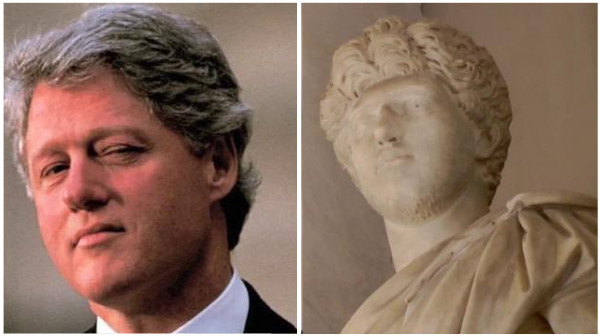
J.G. in San Diego, CA: Millard Fillmore and actor Alec Baldwin:
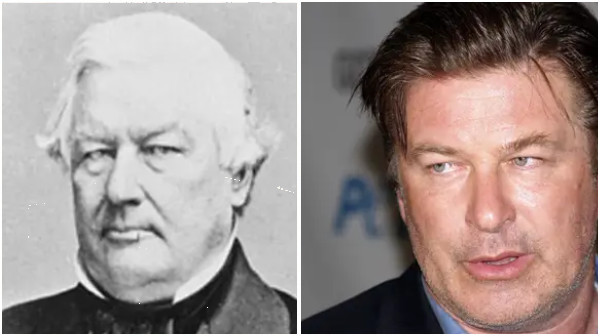
P.S. in Gloucester, MA: When I was a child, I thought that there was a significant resemblance between Richard Nixon and TV host Ed Sullivan:
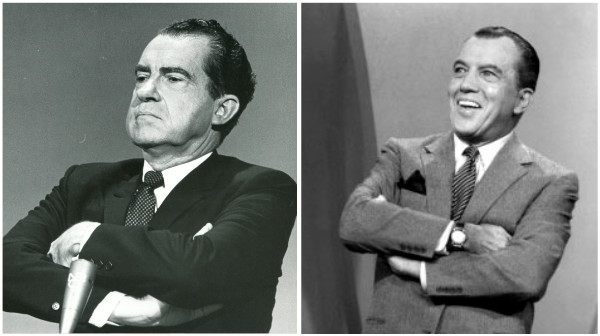
L.T.G. in Bexley, OH: You asked for people who look like politicos, but I can't resist this famous New York Magazine page from 1973:

J.K. in Boston, MA: Joe Biden and game show host Bob Barker:
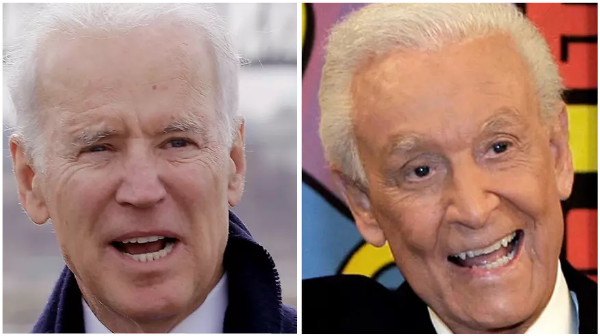
C.J. in Redondo Beach, CA: Considering John Tyler had at least 15 kids, maybe he had some love affair with a British woman somewhere down the line when he was in D.C. (I mean, his first wife did die while he was in the White House). Because the late Peter Cushing had quite a resemblance to the 10th president:
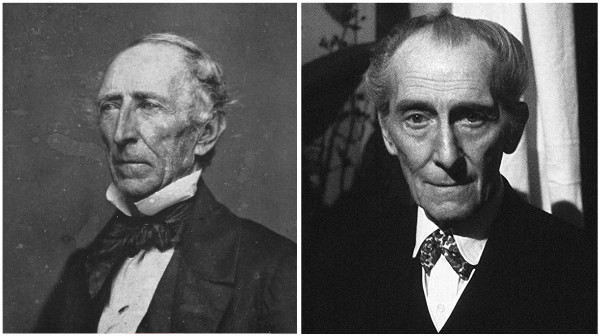
J.M. in New Glasgow, NS, Canada: Russell Crowe and Ulysses Grant:

R.L.D. in Sundance, WY: I've always thought Andrew Johnson could be a time-traveling Tommy Lee Jones:
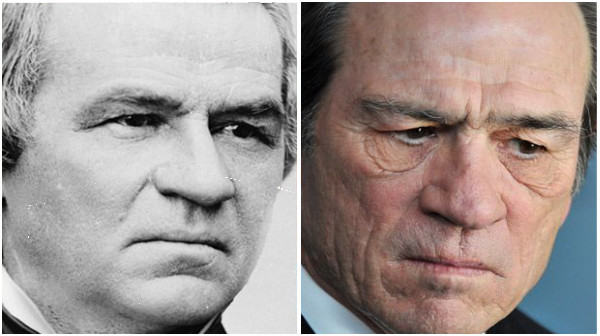
O.B. in Los Angeles, CA: Theodore Roosevelt and actor Wilford Brimley:
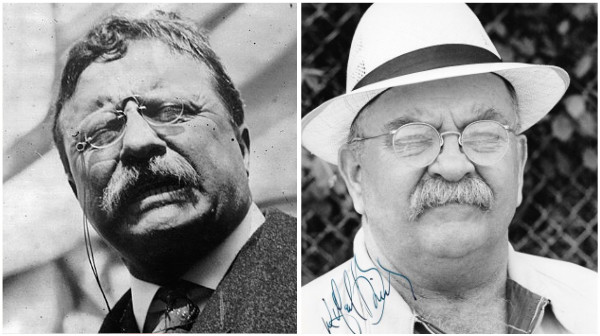
A.G. in London, England, UK: Donald Trump and ALF:
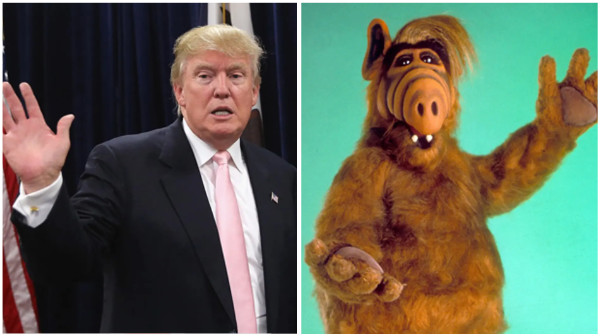
T.L. in West Orange, NJ: Trump and Biff Tannen (but that's too obvious):
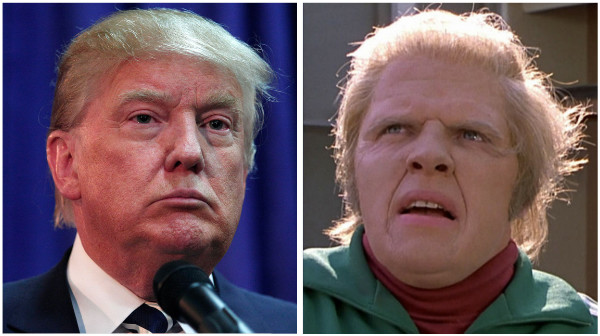
S.S. in West Hollywood, CA: TFG and Roz from Monsters, Inc. (Nuff said.):
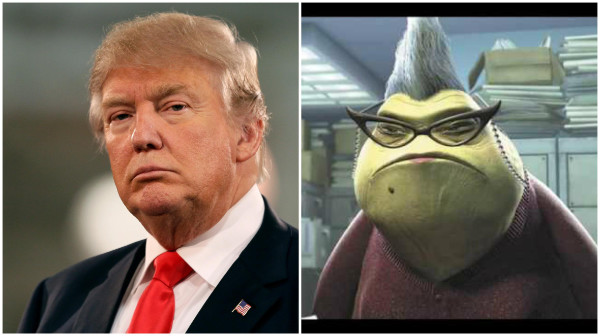
Finally, here is the question for next week:
(V) & (Z) ask: You've now seen our method for evaluating generals, applied now to 11 of the men who led troops in that war. Per this method, what's your evaluation of... any officer we did not evaluate? Can be any war, American or not, any military branch (e.g., admirals), etc.
Submit your answers here!
If you wish to contact us, please use one of these addresses. For the first two, please include your initials and city.
- questions@electoral-vote.com For questions about politics, civics, history, etc. to be answered on a Saturday
- comments@electoral-vote.com For "letters to the editor" for possible publication on a Sunday
- corrections@electoral-vote.com To tell us about typos or factual errors we should fix
- items@electoral-vote.com For general suggestions, ideas, etc.
To download a poster about the site to hang up, please click here.
Email a link to a friend or share:
---The Votemaster and Zenger
May19 The Perils of a 51-Vote Majority
May19 Democrats Wrestle with Their (Self-Created) New Hampshire Problem
May19 Talking about Abortion, Part V: Physicians Weigh In
May19 This Week in Schadenfreude: Mortarboarded
May19 This Week in Freudenfreude: Now That's a Civics Lesson
May18 A Court Hearing Full of Sound and Fury, Signifying Nothing
May18 Talking about Abortion, Part IV: More Questions and Answers
May18 Abortion Appears to Be Wrecking Republicans at the Polls
May18 Trump Legal Blotter, Part I: His Documents Problem Just Keeps Getting Worse
May18 Trump Legal Blotter, Part II: What About the Stolen Voting Machine?
May18 House Punts on "Santos"
May17 The Results Are In
May17 North Carolina Legislature Overrides Governor's Abortion Veto
May17 EMILY's List... Kingmaker?
May17 Progress in Debt Ceiling Talks?
May17 Feinstein Appears to Have Gone from Bad to Worse
May17 Rep. Robert Garcia Introduces Legislation to Expel Rep. "George Santos"
May17 The Greatest Political Movies Ever Made, Part II
May16 Today in Republican Sham Investigations, Part I: The Durham Probe
May16 Today in Republican Sham Investigations, Part II: The Case of the Vanishing Informant
May16 Whaddya Know? Giuliani Is a Sleazeball (Allegedly)
May16 Why Would Anyone Want to Be in Politics?, Part I: Gas Prices
May16 Why Would Anyone Want to Be in Politics?, Part II: Congressman's Staff Attacked
May16 Governance, DeSantis Style
May16 The Greatest Political Movies Ever Made, Part I
May15 DeSantis Receives, Gives Punch in the Mouth
May15 The Trump Problem Returns, Part I: Pollsters
May15 The Trump Problem Returns, Part II: Republican Politics
May15 Today's Longshot Presidential Candidate News
May15 U.S. Senator Denounced as "Profoundly Ignorant Man" over Remarks on Mexico
May15 There Are Some Elections in the U.S. This Week...
May15 ...And There Was One This Weekend in Turkey
May14 Sunday Mailbag
May13 Saturday Q&A
May12 Title 42 Gets Deep-Sixed... Or Not
May12 FBI to Comer: F*** Off
May12 CNN Town Hall: The Day After
May12 Trump and E. Jean Carroll Are Not Finished with Each Other
May12 Another Day, Another Poll (or Two)
May12 Tuberville Doubles Down
May12 This Week in Schadenfreude: Good Riddance
May12 This Week in Freudenfreude: Whitecloud Dispels Storm Clouds
May11 Lucky Number 13 for "George Santos"
May11 Trump Goes to Town on CNN
May11 Interesting Information about "Juror No. 77"
May11 GOP Launches Latest Smear Campaign against Biden
May11 Tuberville's Staff Clarifies His Comments on White Nationalists
May10 Trump's a Loser
May10 "Santos" Is Indicted

